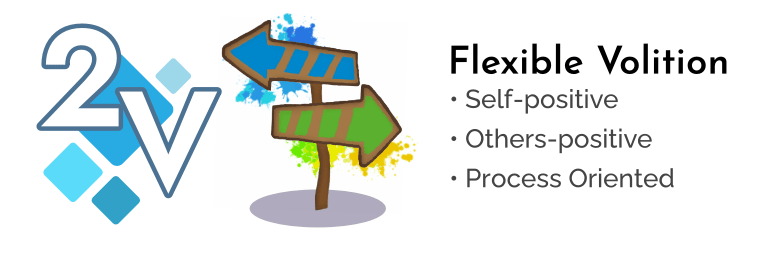
The 2V attitude is characterized by a self-positive (Vs+) and others-positive (Vo+) disposition. This disposition creates an attitude that is acutely aware of how volitional information can be transferred between itself and the outside world in both directions. 2Vs understand the elasticity, usefulness, and creative element within this aspect and generally feel a sense of fearlessness in discussing or sharing information within this realm. The strategies that each 2V employs may differ in behavior or execution but the core attitudinal belief in objective, flexible communication will remain consistent for all 2Vs. Below are some common beliefs and behaviors that you may see with 2Vs. Please keep in mind that these are generalities and do not represent the vast sub-archetypes held within the overall 2V attitude.
Dichotomies
Certain • Sufficient • Strong • Passive • Objective • Fearless • Wordy • Expansive • Universal
Attitudinal Beliefs
• Believes that all people have the right to decide how the future should pan out.
• Knows that they have the power to negotiate responsibilities.
• Assumes and embraces that goals will change and evolve over time.
• Expects that everyone will hear out all sides of a power struggle.
• Presumes that diplomacy should be the first method to use in solving a dispute.
• Believes that the future can be constructed through dialogue.
• Assumes that decisions are never final and can be changed whenever the individual decides to do so.
• Expects that others will share their own vision of the future and what inspires them to act.
• Credits themselves and all surrounding circumstances for where they are in life.
• Trusts that they will learn what they desire and why it is significant over time.
• Believes that their sense of self is easily changed or influenced and can never truly be lost.
• Assumes that no goal is ideal and will always need extra consideration.
• Believes that any situation can be manipulated to favor the individual.
• Knows that goals are a complex medley of interconnected desires, pressures, wants, and expectations that could change in an instant.
• Assumes that everyone has the answer deep within them of where they should be headed in life.
• Believes they can balance out obligations and life changes as they arise.
• Figures that the best version of the future is only possible with consistent compromises.
• Imagines that all motivation is fluid and changeable by default.
• Expects others to question their decisions to leave room for constant change.
• Believes that decisions can be communicated to all individuals they affect.